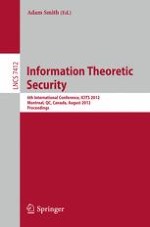2012 | OriginalPaper | Buchkapitel
Efficient Threshold Zero-Knowledge with Applications to User-Centric Protocols
verfasst von : Marcel Keller, Gert Læssøe Mikkelsen, Andy Rupp
Erschienen in: Information Theoretic Security
Verlag: Springer Berlin Heidelberg
Aktivieren Sie unsere intelligente Suche, um passende Fachinhalte oder Patente zu finden.
Wählen Sie Textabschnitte aus um mit Künstlicher Intelligenz passenden Patente zu finden. powered by
Markieren Sie Textabschnitte, um KI-gestützt weitere passende Inhalte zu finden. powered by
In this paper, we investigate on
threshold proofs
, a framework for distributing the prover’s side of
interactive proofs of knowledge
over multiple parties. Interactive proofs of knowledge (PoK) are widely used primitives of cryptographic protocols, including important user-centric protocols, such as identification schemes, electronic cash (e-cash), and anonymous credentials.
We present a security model for threshold proofs of knowledge and develop threshold versions of well-known primitives such as range proofs, zero-knowledge proofs for preimages of homomorphisms (which generalizes PoKs of discrete logarithms, representations, p-th roots, etc.), as well as OR statements. These building blocks are proven secure in our model.
Furthermore, we apply the developed primitives and techniques in the context of user-centric protocols. In particular, we construct distributed-user variants of Brands’ e-cash system and the bilinear anonymous credential scheme by Camenisch and Lysyanskaya. Distributing the user party in such protocols has several practical advantages: First, the security of a user can be increased by sharing secrets and computations over multiple devices owned by the user. In this way, losing control of a single device does not result in a security breach. Second, this approach also allows
groups of users
to jointly control an application (e.g., a joint e-cash account), not giving a single user full control.
The distributed versions of the protocols we propose in this paper are relatively efficient (when compared to a general MPC approach). In comparison to the original protocols only the prover’s (or user’s) side is modified while the other side stays untouched. In particular, it is oblivious to the other party whether it interacts with a distributed prover (or user) or one as defined in the original protocol.
